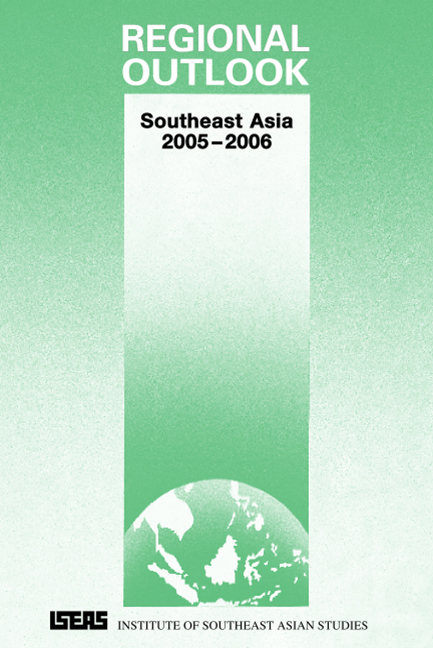Preface
Published online by Cambridge University Press: 21 October 2015
Summary
Regional Outlook was launched in 1992. Designed for the busy executive, professional, diplomat, journalist, and interested observer who face severe time constraints, this annual offers a succinct analysis of political and economic trends in the countries of Southeast Asia and the outlook for the forthcoming two years.
Just as 2003 was difficult for Southeast Asia, the year 2004 has had its share of problems. The external security environment continues to be grave. The festering military conflict in Iraq and its impact on the US presidential election have serious implications for the US fight against international terrorism. The terrorist threat has not receded. Indonesia suffered its third suicide bombing incident. The region has to be sensitized to new forms of terrorist attacks, particularly on the high seas where no one national authority is in charge. Unabated tensions between China and Taiwan continue to point to a possibility of military conflict. The North Korea nuclear programme adds another item to the list of worries.
However, on the economic front, the outlook is fairly robust, with a rebound in global economic growth. The region is expected to register a strong GDP growth rate of 6.2 per cent in 2004 according to the Asian Development Bank. However, rising oil prices, the possibility of an economic slowdown in China, terrorism concerns in the region, and the continued sporadic outbreaks of the avian flu are potential risk factors that are likely to affect the short-to-medium-term growth prospects of the region. It is expected that improved business investment and consumer spending will keep the region's economic growth fairly robust in 2005 and 2006. ASEAN efforts to step up regional economic cooperation as well as strengthen bilateral links with major trading partners — including the three major economies of Japan, China, and India — will have regional impact. However, there are concerns with the slow progress of ASEAN economic integration. Regional Outlook: Southeast Asia 2005–2006 was written by a team of scholars from within the Institute and without.
- Type
- Chapter
- Information
- Regional OutlookSoutheast Asia 2005-2006, pp. vii - viiiPublisher: ISEAS–Yusof Ishak InstitutePrint publication year: 2004

